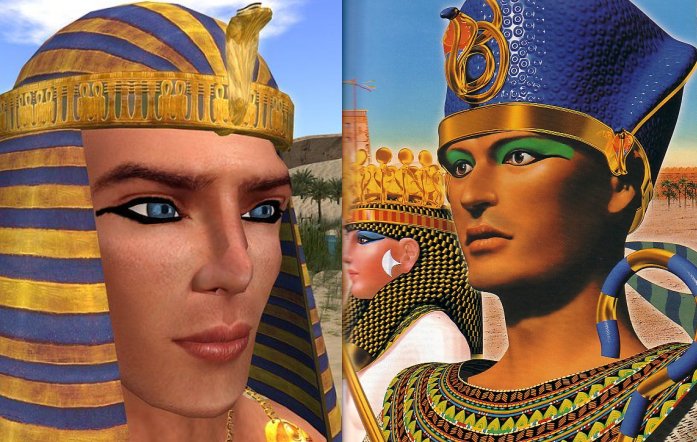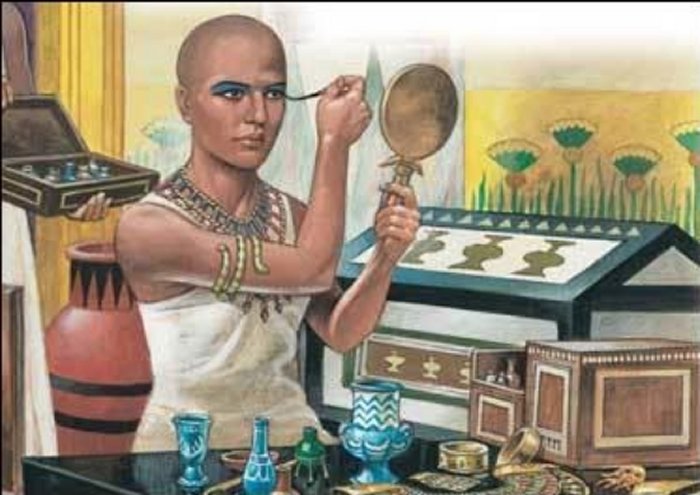Ancient Egyptian Men Used Eye Makeup For Many Reasons
AncientPages.com - Frescoes discovered in ancient Egyptian temples illustrating daily life reveal men often wore makeup. In facts, it’s almost impossible to find a portrait of an ancient Egyptian whose eyes are not decorated.
During all periods and dynasties, eye makeup was a daily prerequisite for both men and women. Why did ancient Egyptian men wear eye makeup? There were a number of reasons actually.
Ancient Egyptian eye makeup was very elaborate and used as early as 4000 B.C. Eye makeup equipment (palettes, grinders, applicators) has been found among the earliest burials of the pre-dynastic period and seem to have been essential items for the afterlife.
Ancient Egyptians used a variety of cosmetics such as eye make up, rouge and perfumed oils that softened the skin and prevented burning in the sun and damage from the sandy winds. Galena powder possesses disinfectant and fly-deterrent properties.
It is believed to offer the eyes protection from intense sun.
The smoky kohl liner served both practical and ritualistic purposes. It was thought to repel flies, protect the eyes from the Sun's rays and ward off infection. Makeup helped to imitate the looks of the gods. Favorite eye make up colors were black and green and outlining the eyes with pigment was deliberately done to created an almond or feline shape.
Eye make up provided psychic protection as well. The Egyptian word for eye-palette seems to derive from their word for "protect." An unadorned and thus unprotected eye was believed vulnerable to the Evil Eye. Outlining the eyes thus became a personal protective amulet drawn right upon the skin; an amulet that once applied could not be lost or misplaced. Makeup was believed to have magical healing powers.
Although cosmetics were certainly used for the purpose of beautification, in ancient Egypt, eye makeup did more than paint a pretty face.
Copyright © AncientPages.com All rights reserved. This material may not be published, broadcast, rewritten or redistributed in whole or part without theexpress written permission of AncientPages.com
More From Ancient Pages
-
 Amakuni – Legendary Japanese Blacksmith And Father Of The Samurai Sword
Featured Stories | Jan 23, 2019
Amakuni – Legendary Japanese Blacksmith And Father Of The Samurai Sword
Featured Stories | Jan 23, 2019 -
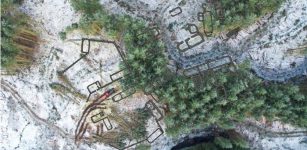 Ruins Of Post-Medieval Brunell Township Discovered In Glen Brittle Forest On The Isle of Skye
Archaeology | Feb 29, 2024
Ruins Of Post-Medieval Brunell Township Discovered In Glen Brittle Forest On The Isle of Skye
Archaeology | Feb 29, 2024 -
 On This Day In History: Mathematician And Astronomer Simon Marius Independently Rediscovered Andromeda Galaxy – On Dec 15, 1612
News | Dec 15, 2016
On This Day In History: Mathematician And Astronomer Simon Marius Independently Rediscovered Andromeda Galaxy – On Dec 15, 1612
News | Dec 15, 2016 -
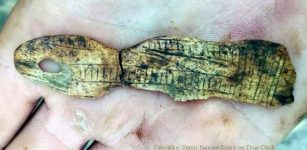 Prehistoric Sime Skeleton And Now 15,000-Year-Old Bone Pendant Depicting ‘Venus’ Found In Vlakno Cave, Croatia
Archaeology | Dec 4, 2017
Prehistoric Sime Skeleton And Now 15,000-Year-Old Bone Pendant Depicting ‘Venus’ Found In Vlakno Cave, Croatia
Archaeology | Dec 4, 2017 -
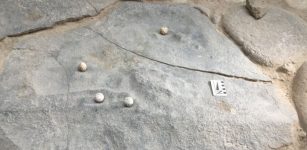 Mysterious Stone Spheres Could Be From Ancient Greek Board Game – Scientists Say
Archaeology | Sep 30, 2022
Mysterious Stone Spheres Could Be From Ancient Greek Board Game – Scientists Say
Archaeology | Sep 30, 2022 -
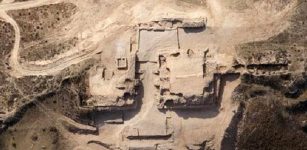 First Chinese Murals Unearthed In Shimao Ruins Are Over 4,000 Years Old
Archaeology | Aug 22, 2015
First Chinese Murals Unearthed In Shimao Ruins Are Over 4,000 Years Old
Archaeology | Aug 22, 2015 -
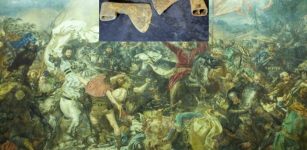 600-Year-Old Axe Heads Used In The Battle Of Grunwald Found in Poland
Archaeology | Sep 1, 2020
600-Year-Old Axe Heads Used In The Battle Of Grunwald Found in Poland
Archaeology | Sep 1, 2020 -
 How Was The Mysterious Menga Dolmen Built By Neolithic People? New Scientific Theory Presented
Archaeology | Aug 28, 2024
How Was The Mysterious Menga Dolmen Built By Neolithic People? New Scientific Theory Presented
Archaeology | Aug 28, 2024 -
 Freemasons Secrets – American Democracy Is Part Of An Ancient Universal Plan – The Beginning And The Dream Of A Brotherhood Of Men – Part 1
Ancient Mysteries | Jul 12, 2018
Freemasons Secrets – American Democracy Is Part Of An Ancient Universal Plan – The Beginning And The Dream Of A Brotherhood Of Men – Part 1
Ancient Mysteries | Jul 12, 2018 -
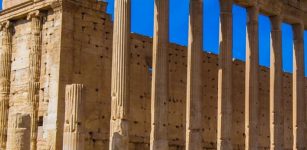 World-Famous Temple Of Bel In Palmyra, Syria – Digitally Reconstructed
News | Aug 22, 2020
World-Famous Temple Of Bel In Palmyra, Syria – Digitally Reconstructed
News | Aug 22, 2020 -
 Amazing Finds At Rutland Roman Villa Reported By Archaeologists
Archaeology | Nov 29, 2022
Amazing Finds At Rutland Roman Villa Reported By Archaeologists
Archaeology | Nov 29, 2022 -
 Maximilien de Robespierre: A True Revolutionary Man Or A Madman?
Featured Stories | Dec 22, 2015
Maximilien de Robespierre: A True Revolutionary Man Or A Madman?
Featured Stories | Dec 22, 2015 -
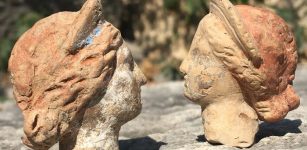 Beautiful Terracotta Figurine Collection Discovered In Myra, Antalya
Archaeology | Sep 29, 2020
Beautiful Terracotta Figurine Collection Discovered In Myra, Antalya
Archaeology | Sep 29, 2020 -
 Enigmatic Denisovans Interbred With Modern Humans More Than Once
Archaeology | Mar 22, 2018
Enigmatic Denisovans Interbred With Modern Humans More Than Once
Archaeology | Mar 22, 2018 -
 Surprising Discovery Of Rare Turtle Statue Under Bayon Temple In Angkor, Cambodia
Archaeology | May 2, 2024
Surprising Discovery Of Rare Turtle Statue Under Bayon Temple In Angkor, Cambodia
Archaeology | May 2, 2024 -
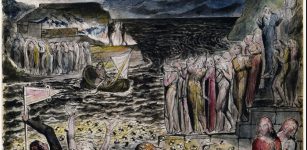 Tartarus – The Land Of The Dead – Mysterious Underground World
Featured Stories | Sep 13, 2015
Tartarus – The Land Of The Dead – Mysterious Underground World
Featured Stories | Sep 13, 2015 -
 Man In Sweden Finds Viking Age Skeleton In His Garden
Archaeology | Jun 30, 2023
Man In Sweden Finds Viking Age Skeleton In His Garden
Archaeology | Jun 30, 2023 -
 Fossil Study: Coelacanths Thrived In Switzerland After A Mass Extinction
Fossils | Jul 28, 2023
Fossil Study: Coelacanths Thrived In Switzerland After A Mass Extinction
Fossils | Jul 28, 2023 -
 Oldest Known Sami Manuscript Discovered – It’s Undeciphered And Written By An Unknown Author
Linguistic Discoveries | Nov 26, 2024
Oldest Known Sami Manuscript Discovered – It’s Undeciphered And Written By An Unknown Author
Linguistic Discoveries | Nov 26, 2024 -
 Germany’s Stonehenge Pömmelte Reveals More Secrets – 140 Wooden Houses And 78 Silos Found
Archaeology | Jul 2, 2024
Germany’s Stonehenge Pömmelte Reveals More Secrets – 140 Wooden Houses And 78 Silos Found
Archaeology | Jul 2, 2024

